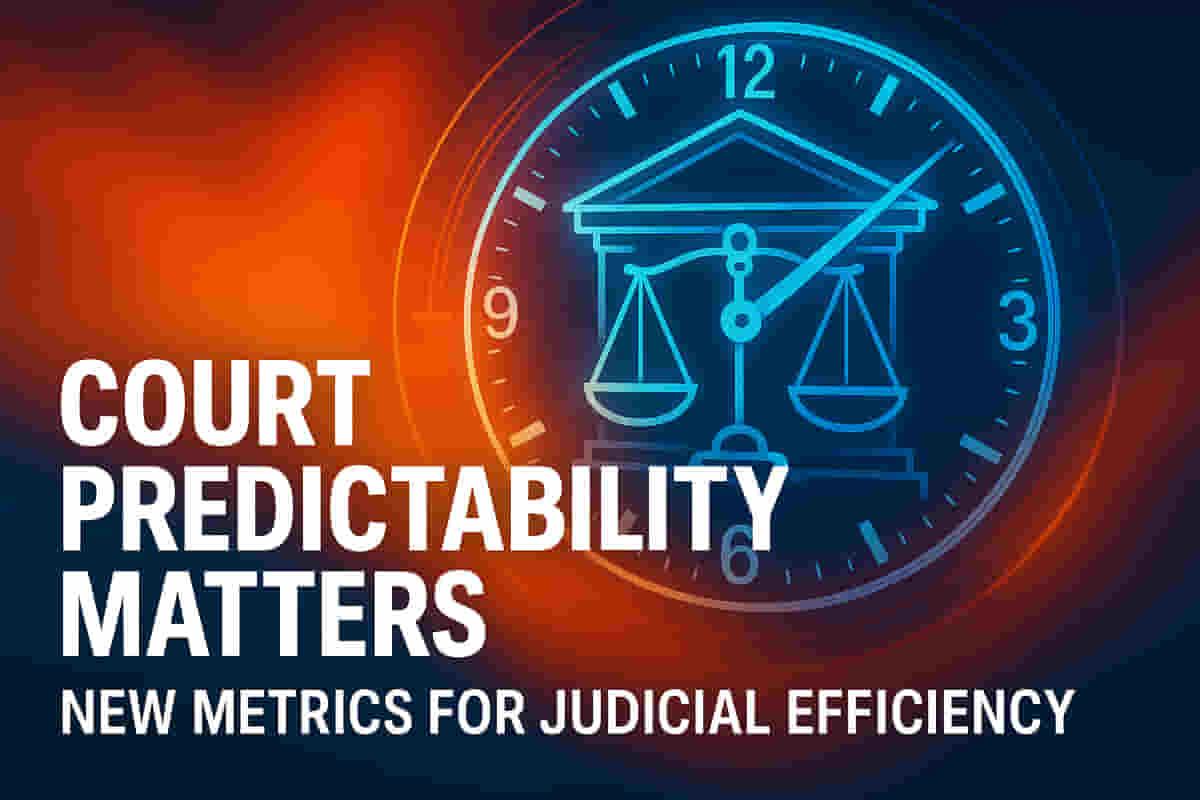Court Predictability: New Metrics to Gauge Judicial System Efficiency for Litigants
Law/Court
|
Updated on 30 Oct 2025, 09:35 am
Reviewed By
Aditi Singh | Whalesbook News Team
Short Description :

▶
Detailed Coverage :
The article emphasizes that while court efficiency (how long a case takes) is important, predictability is equally crucial for litigants. Predictability here refers to whether courts adhere to scheduled hearing dates and whether each appearance meaningfully advances the case, rather than predicting the outcome. The absence of predictability can make the justice system feel arbitrary and unreliable, much like a doctor's appointment being indefinitely postponed.
For lawyers and litigants, unpredictable court schedules lead to real economic and personal costs, including wasted travel, lost wages, and increased uncertainty. The article proposes two measurable metrics to gauge predictability:
1. **Time Between Hearings:** This metric calculates the median gap between successive hearings for a case. Knowing this frequency helps litigants plan costs (like travel) and manage their time effectively. 2. **Percentage of Substantive Hearings:** This metric measures the proportion of hearings that result in actual progress for the case, as opposed to those ending in adjournments for procedural reasons or lack of time. A low percentage indicates significant wasted effort.
Together, these metrics provide insights into the 'actual' trajectory of a case, empowering litigants to make strategic decisions such as opting for settlement or adjusting their litigation approach. The article notes a data gap in comparing 'actual' versus 'promised' hearing dates and mentions the work of XKDR Forum in providing such data insights, including their collaboration on the '24x7 ON Courts initiative'.
Impact This news is highly relevant for the Indian judicial system and businesses operating within it, as it addresses inefficiencies that impact legal processes and business certainty. Rating: 7/10.
Difficult Terms Explained: * **Predictability (in court context):** The certainty that a court will proceed with a hearing on the scheduled date and that the hearing will contribute meaningfully to the case's progress. * **Efficiency:** The measure of how quickly and effectively a case is processed through the court system. * **Litigants:** Individuals or parties involved in a lawsuit or legal dispute. * **Substantive Hearings:** Court sessions where the judge considers the merits or substantial procedural aspects of a case, leading to a tangible advancement towards resolution. * **Non-substantive Hearings:** Hearings that do not result in significant progress, often ending in adjournments or administrative matters. * **Adjournments:** The postponement of a scheduled court hearing to a later date. * **Cause List:** A daily list of cases scheduled to be heard by a particular court.
More from Law/Court
Latest News

Auto
Suzuki and Honda aren’t sure India is ready for small EVs. Here’s why.

Brokerage Reports
Stocks to buy: Raja Venkatraman's top picks for 4 November

Mutual Funds
Quantum Mutual Fund stages a comeback with a new CEO and revamped strategies; eyes sustainable growth

Tech
Why Pine Labs’ head believes Ebitda is a better measure of the company’s value

Banking/Finance
SEBI is forcing a nifty bank shake-up: Are PNB and BoB the new ‘must-owns’?

Industrial Goods/Services
India’s Warren Buffett just made 2 rare moves: What he’s buying (and selling)
Renewables Sector

Renewables
Brookfield lines up $12 bn for green energy in Andhra as it eyes $100 bn India expansion by 2030
Energy Sector

Energy
India's green power pipeline had become clogged. A mega clean-up is on cards.
Renewables Sector

Brookfield lines up $12 bn for green energy in Andhra as it eyes $100 bn India expansion by 2030
Energy Sector
